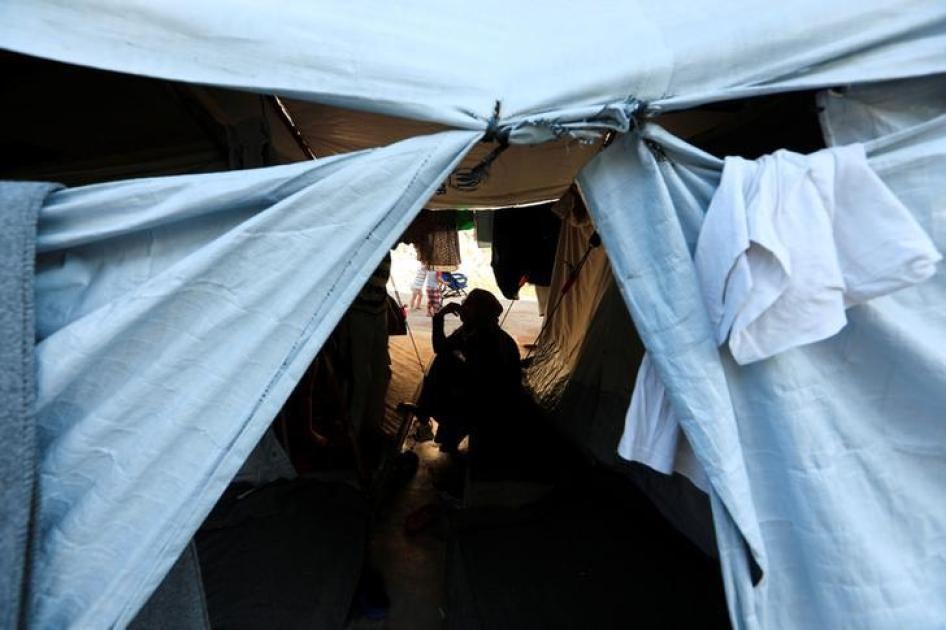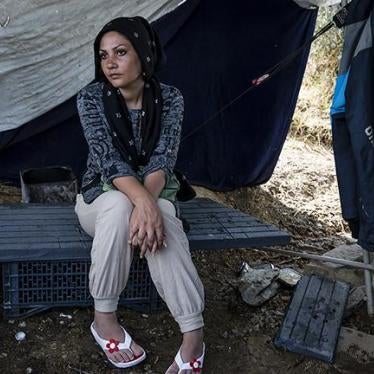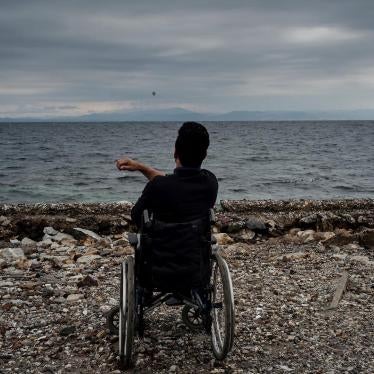Thousands of asylum seekers are trapped in crowded and filthy processing centers on the Greek islands, with many spending the winter in lightweight tents or even sleeping outside on the ground. Greece contends it has to keep the asylum seekers on the islands because a March 2016 agreement between the European Union and Turkey provides that asylum seekers who arrive by boat from Turkey should be sent back there to have their asylum claims processed.
After a December campaign by 13 nongovernmental groups, including Human Rights Watch, to move the asylum seekers to safer conditions on the Greek mainland, more than 7,000 people have been moved. But thousands more have arrived on the islands or remain trapped there. By the latest count, more than 13,000 people are on the Greek islands, many of them in vastly overcrowded centers.
The following questions and answers explain the situation and what needs to be done about it.
Q: Why is Greece forcing asylum seekers to remain on the Greek islands?
An EU-Turkey “statement” from March 2016 committed Turkey to accept the return of all asylum seekers who reached the Greek islands by traveling through Turkey and crossing the sea. In return, the EU agreed to provide billions of euro in aid and other benefits, and to resettle an equal number of Syrians who were already in Turkey.
The Greek government, under a “containment” policy, decided to keep asylum seekers confined to the islands to facilitate their speedy processing and return to Turkey.
Members of vulnerable groups – including pregnant women, older people, unaccompanied children, single parents with children, victims of torture or sexual or gender-based violence, and people with disabilities – and people eligible to be reunited with family members already in the EU are supposed to be exempt. But they are not always identified by the authorities and there has been considerable pressureon Greece from the EU and its member states to narrow the criteria to minimize the numbers of people eligible.
Q: What are the consequences of this containment policy?
The islands have become places of indefinite confinement for thousands of people where they do not have timely access to asylum procedures nor benefit from the protection they are entitled to. Many have been stuck there for months on end.
This has significant consequences for their health and wellbeing. In addition to dire living conditions, including insufficient food, many can’t get physical and mental health services or education for their children or even police protection if violence breaks out in these tense conditions.
Many people have attempted to end their lives due to the extreme distress and emotional pain they experience. In October, Medecins Sans Frotieres (MSF) reported that between June and September, an average of six to seven people per week arrived at their clinic on Lesbos for mental health consultations following suicide attempts, incidents of self-harm, or psychotic episodes.
Women and girls say they experience sexual harassment and threat of violence daily, deterring them from leaving their shelters or even going to the bathroom alone. They express little confidence that Greek authorities would help or protect them if they report incidents.
Q: How does the containment policy affect local people on the islands?
The containment policy has caused significant tensions on the islands. Mayors from the five Greek islands affected said in December that the containment policy had turned their communities into “island prisons.”
While many Greek people continue to offer help, some residents and local authorities who showed support and solidarity before the EU-Turkey deal are increasingly having a hard time accepting the strain on the local infrastructure. Nongovernmental groups on the islands have reported some racist and xenophobic incidents, exacerbating fear and anxiety among the asylum seekers trapped there.
Q: Aren’t conditions on the mainland just as bad?
Even though the conditions on the mainland need improvement, they are much better than on the islands. The mainland has facilities that are not overcrowded, are protected from the winter weather, and offer better security and access to services, with some room for expansion.
In addition, the United Nations High Commissioner for Refugees’ (UNHCR) accommodation program provides 22,000 rented housing places to vulnerable asylum seekers and refugees, including to asylum seekers transferred from the islands.
People on the mainland have better access to services such as hospitals and specialized health care support, and children, the vast majority of whom have no access to education on the islands, can enroll in school on the mainland where programs are in place.
The EU and other member states should financially support Greece to expand asylum seekers’ accommodation on the mainland and take steps to relocate asylum seekers from Greece to other EU countries. Other EU member states should also refrain from resuming returns of asylum seekers to Greece, which would exacerbate its problems with reception conditions for asylum seekers.
Q: Wouldn’t speeding up asylum procedures on the islands end the overcrowding and the dire conditions?
The initial EU-Turkey plan envisioned that most asylum seekers would quickly be sent back to Turkey to have their asylum claims processed there.
In reality, the majority of asylum seekers trapped on the islands lack a realistic prospect of return to Turkey under the deal, either because they are considered “vulnerable” and protected from the expedited proceedings that are in place to implement the agreement, have family elsewhere in the EU and are entitled to reunite with them, or come from countries with conditions that make it likely they will be admitted to the regular Greek asylum system for a full examination of their claim. Migration control is not grounds for harming the wellbeing, health, and dignity of those trapped on the islands.
The only way to increase the number or speed of returns to Turkey would be by weakening the safeguards or quality of the process. This is no way to treat a traumatized population, and the wrong way to alleviate overcrowding or address the systemic issues linked to the containment policy and EU-Turkey deal that have created this inhumane situation on the islands.
Such an approach would be inconsistent with Greece’s obligations under EU asylum law and international refugee and human rights law.
Q: Won’t opening the islands encourage more asylum seekers to take a risky journey by sea from Turkey to Greece?
The aim of the EU-Turkey deal, and subsequently of the containment policy, is to discourage migrants and asylum seekers from making the crossing from Turkey to Greece to enter the EU.
But it is unclear how much of a role the policy of containment has played in decreasing arrivals in comparison with other factors. The border closures along the Western Balkans route to the north of Greece, making it very difficult to reach other EU countries by land via Greece, increased Turkey’s action against smuggling networks, and the prospect of having to remain in Greece, even on the mainland, are also likely to be important factors in discouraging arrivals alongside the containment policy.
Containing asylum seekers on the Greek islands in substandard and appalling conditions that violate their rights and Greece’s international obligations in the hope that it will deter others from coming is bad policy. The EU should look instead at sharing responsibility across member states, tackling root causes of migration, and increasing availability of more safe and legal channels into the EU.
Q: What can the rest of the EU do to help improve the dire conditions on the islands?
The EU and its member states should agree on the need to end the containment policy and to immediately transfer the asylum seekers to Greece’s mainland. They should support the Greek government’s efforts to meet the protection needs of all asylum seekers in its territory, and ensure their safety and dignity, including relocating asylum seekers from Greece.









